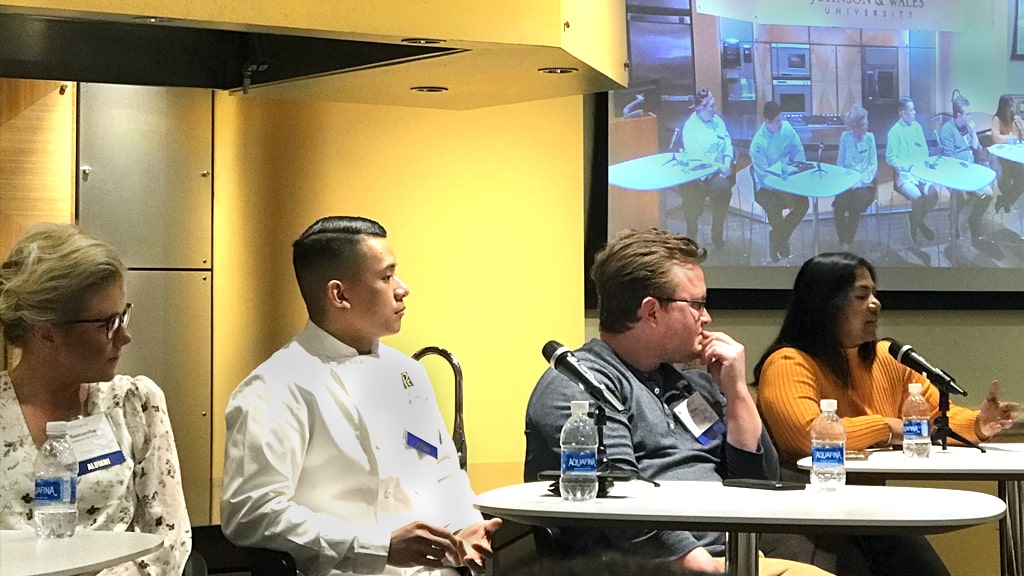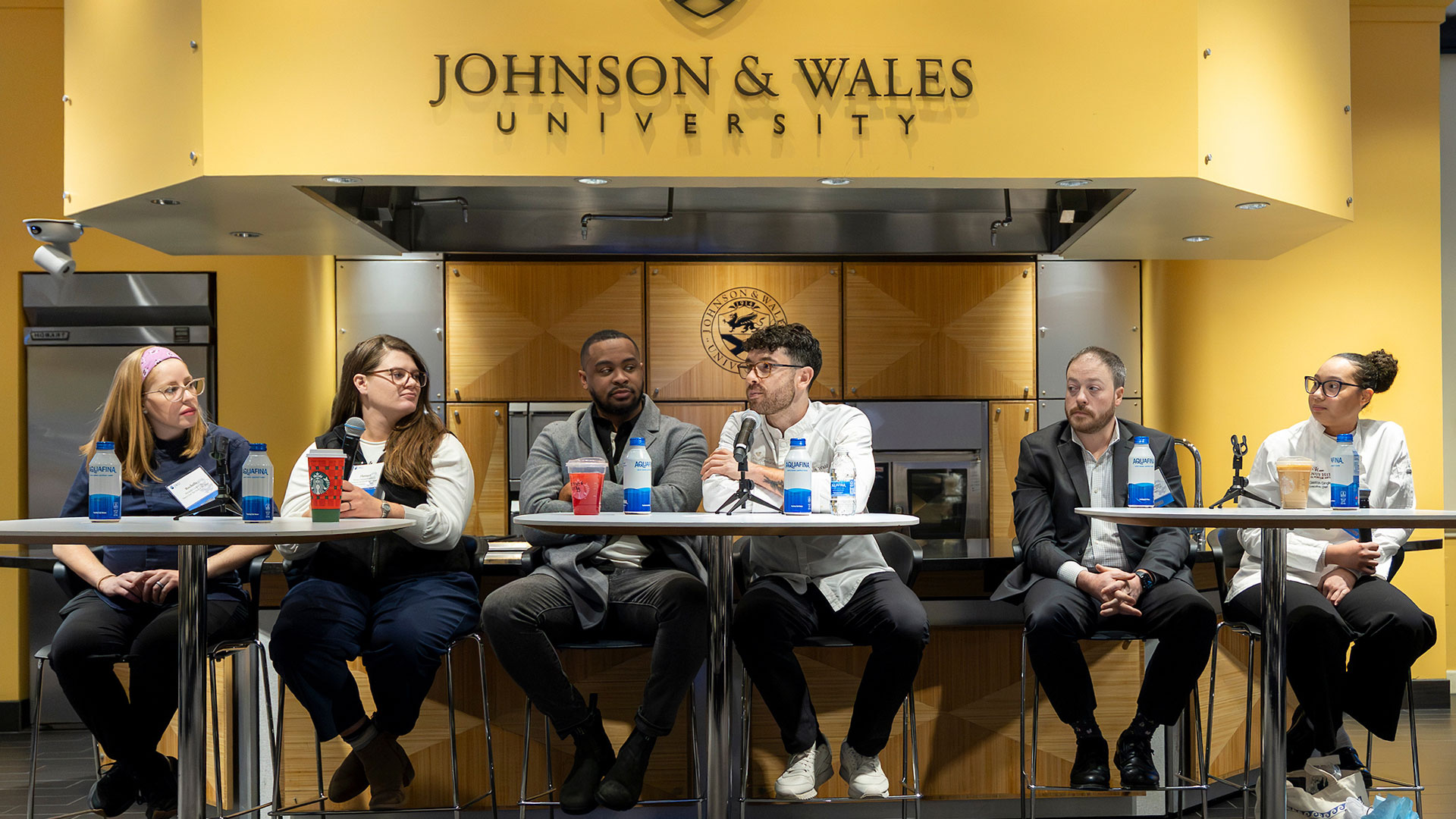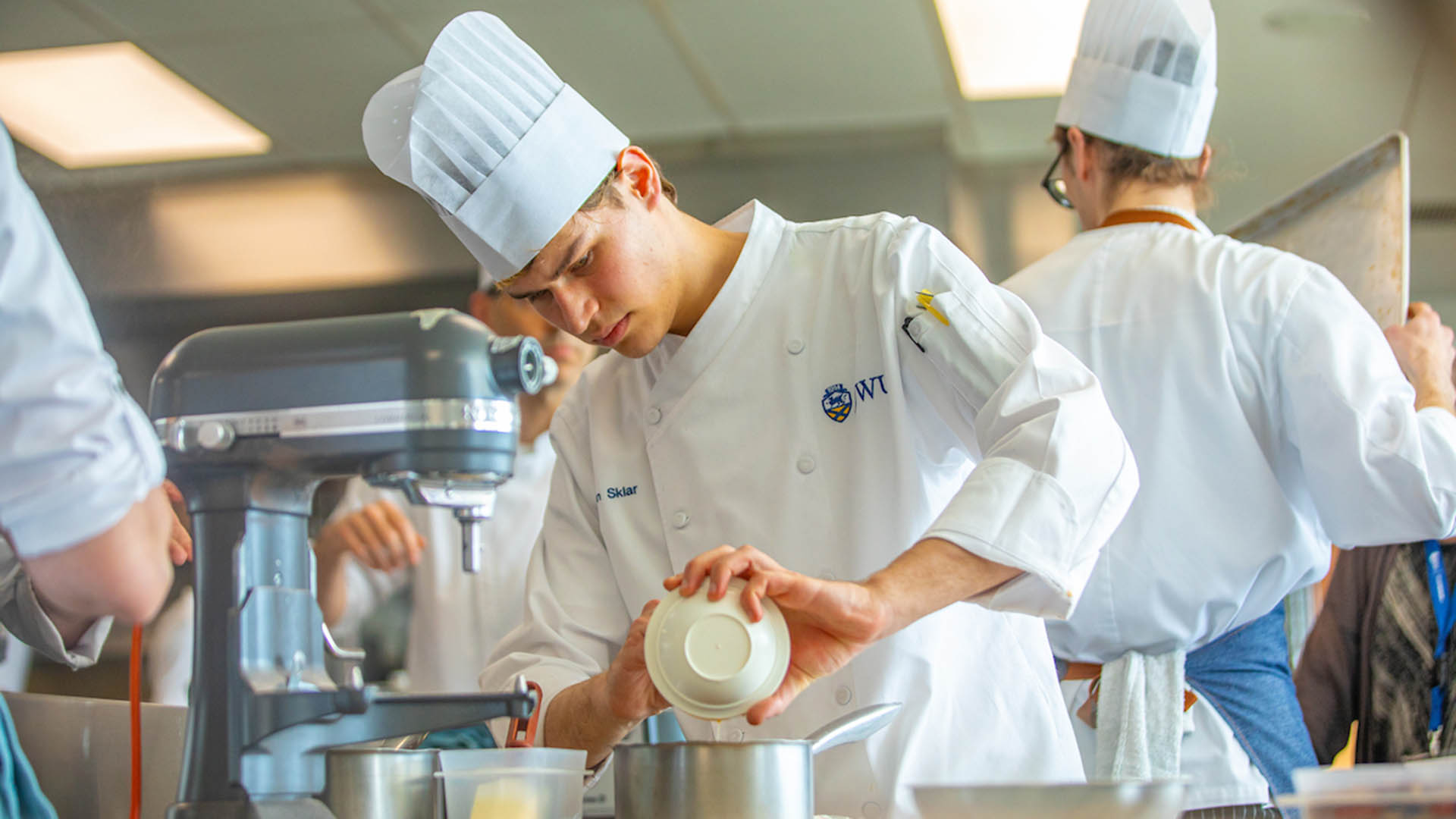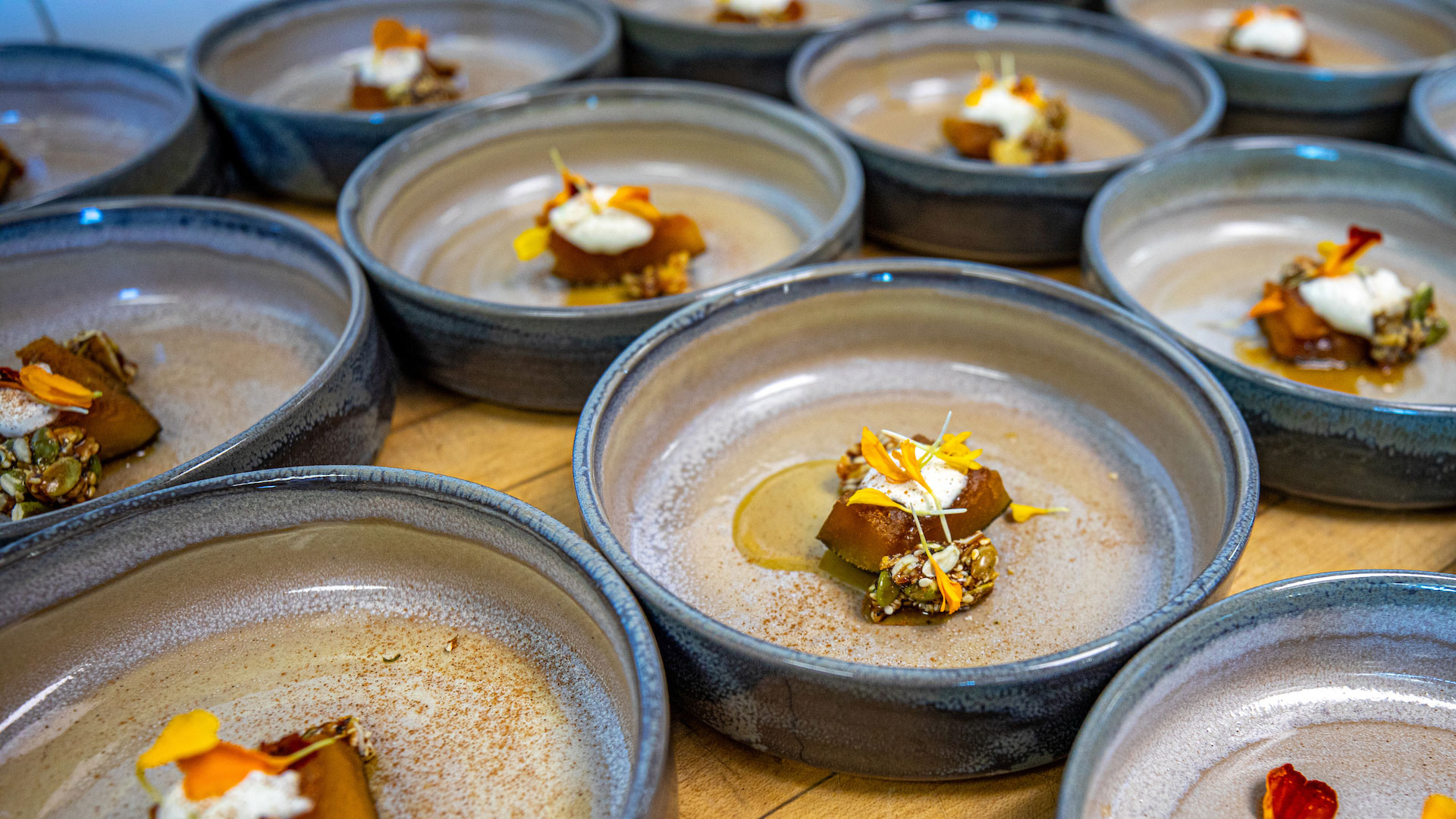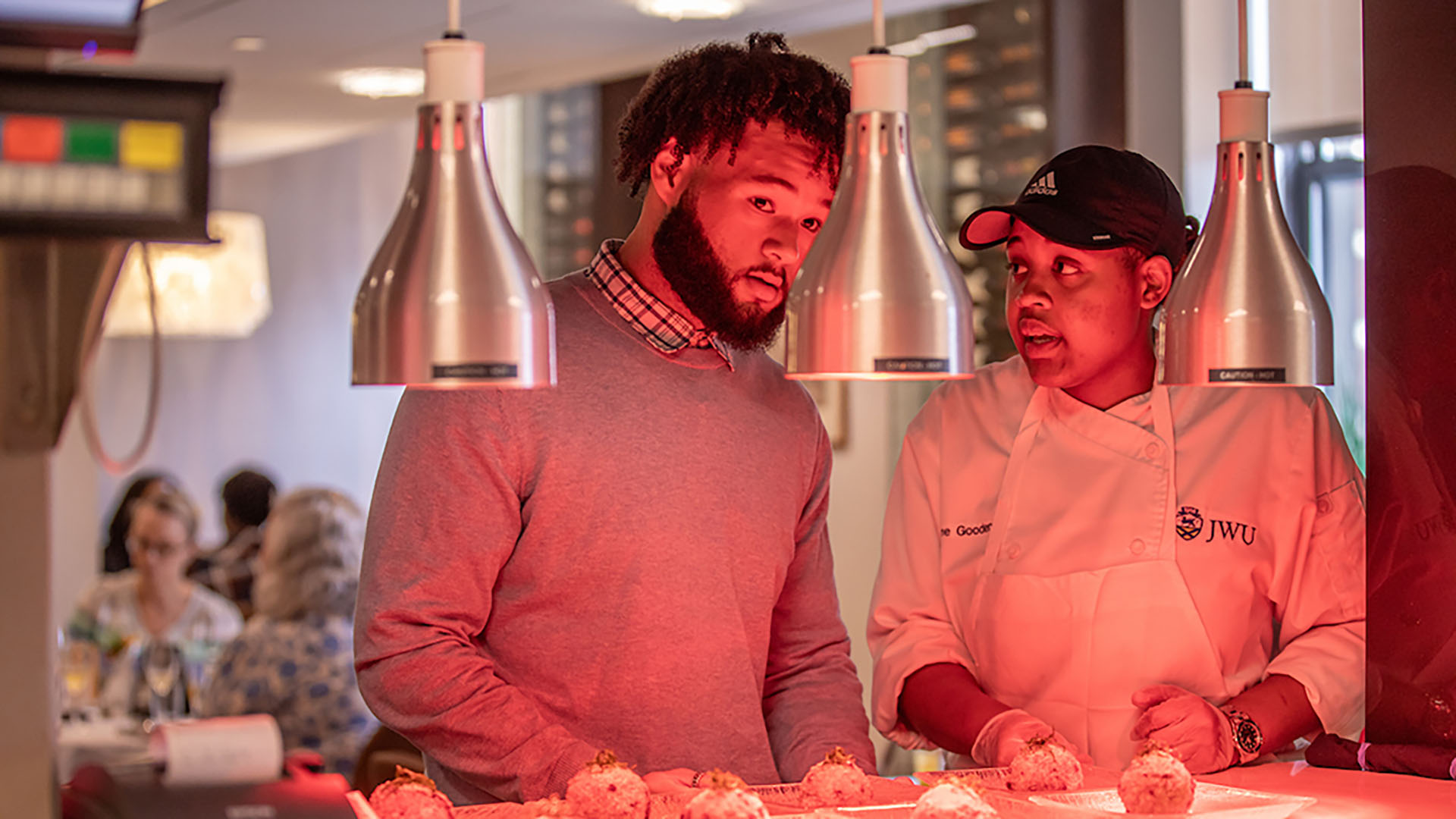Alumni Leaders Share Essential Skills for Culinary Success
When it comes to building a successful culinary career, only one thing is certain: Your goals, path, and personal standard of excellence are uniquely your own. That sentiment was echoed by the six College of Food Innovation & Technology (CFIT) alumni that returned to JWU Providence to share their stories and career evolution with culinary arts, baking & pastry arts, and culinary nutrition students.
The alumni panelists:
- Samantha Block '13, associate editor, America’s Test Kitchen
- Andrew Brooks '17, executive chef, Weekapaug Inn
- Colleen Kranich '18, executive pastry chef, Newport Vineyards
- Geoffrey Lanez CEC '12, '14 MBA, executive chef, The Patterson Club
- Brian Paszko '12, culinary advisor/consultant, AC Kitchen
- Aarthi Sampath '14, restaurant consultant; Food Network “Tournament of Champions” contestant
What was your first job in the industry? How did you find JWU?
Brian Paszko: I loved my first job. I fell into dishwashing at this catering place called Simply Elegant Catering that was run by a chef who graduated from JWU. There were 8 people in this big commissary kitchen. And I had to go into the dish pit and clear it out every day because when weddings break down, everything comes back from the event and the guys dump everything in the dish pit.
On my first day I cleaned it out. It was around two o’clock in the afternoon. The chef-owner came up to me and said, “You’re done?” And I’m like, “Yeah, I’m done. What’s next?” He said, “I’ve never had a dishwasher ask me that!” And so right away after I cleaned the dish pit out, I was like, “Aw, sweet. This is when I get to go in the kitchen.” So I would jump full speed into the kitchen and prep. And I would always go to the next cook who was having a tough time of their day, trying to get through their list.
“One of the biggest tools is LinkedIn. Get on there. Look at what other people in the industry are talking about. Professionals want to meet up-and-coming chefs like yourselves.”
I did that for my last two years of high school. And then I was like, I gotta go to school. And my mentor there, Paul April, said, “Go to Johnson & Wales. I’ll help you out with a simple scholarship.” So I went to JWU and that attitude of being part of a team and feeling good about saying ‘what’s next?’ — that’s always been instinctive with me. And I just knew: I love this industry.
Colleen Kranich: I started the same way that Brian did. I worked at a wedding venue washing dishes. And once I was done washing dishes, I joined the prep team. But I was drawn more to the decorative side. I loved making huge cheese boards, veggie boards. I have the biggest sweet tooth. So I knew I wanted to go pastry. I love that desserts make people smile, and the last thing you eat after a restaurant is dessert — that’s your lasting memories that sweet walking out.
And I wanted to still have that traditional college experience. So I found JWU. I had my summers off, so I worked. And I got to join some amazing clubs and I did intramural soccer. I loved having the community of the school around me.
Networking, networking, networking: What opportunities has JWU helped you access?
Andrew Brooks: I can’t stress enough the importance of going to a job fair, even if it’s just to network — there’s so many different jobs and ways you can go. I always worked in restaurants; the job fair was what led me into hotels — I joined the Leader in Development program with Omni Hotels. And I moved down to Florida. I became a sous chef. Then got into banquets. I left there and went to the Ritz Carlton. All of this was possible through JWU and the networking of the career fairs.
Geoffrey Lanez: I was heavily involved in the American Culinary Federation (ACF). So a lot of my days and mornings and nights were here, tournéeing and breaking down chickens. We got involved with competing. Because of that, I got to meet Chef [Joseph] Leonardi, who is a master chef up in Boston. And he introduced me to these other chefs and that just kind of blew up into a network. Now I know a chef in every state or country. And it all started here at JWU, supporting me in competitions.
Best ways to expand your professional network?
Andrew Brooks: One of the biggest tools is LinkedIn. Get on there. Look at what other people in the industry are talking about, what they’re achieving. There’s so much evolving in the industry. Professionals want to meet up-and-coming chefs like yourselves. Be confident and get yourself out there as much as you possibly can.
Brian Paszko: I completely agree with Andrew on LinkedIn. It’s a perfect place to have a grounded area where you can present yourself — as well as see the industry presented, see who’s doing what.
A big, big thing — and this is something I’ve been doing recently over, over the last, say, three years — is when you hit a certain transition in your career, learn to promote yourself.
You are a valuable person. Your time is valuable. Your skill that you learned is very distinctive. Use that and apply it every day. For me, where I’m currently right now as a culinary advisor — I made that title for myself. I found a niche in the business where I built out three restaurants in Boston literally from scratch, getting quotes, chasing down vendors, looking at properties. I’m learning these things. Someone’s paying me to learn this and to be good at it. I took that and I self-promoted it to a way where I’m now a consultant.
Don’t worry about so much about hitting the ceiling. There’s plenty of opportunity.
What personal attributes are essential for success?
Colleen Kranich: I think being humble is such an important thing. If you come in and you’re humble and willing to learn from anyone, that’s a super important quality to have. I’m constantly learning. I’ve learned stuff from my interns coming in, my sous chefs. Be willing to listen to everyone, and not just follow the traditional hierarchy.
Aarthi Sampath: I’ve learned a very important lesson in the last few years is not letting things slide, especially in a kitchen. You’ve already delayed on a table and you know that this piece of meat is overcooked or the sauce is not the way it’s supposed to be. It’s a very hard decision to make at that moment, but stopping right there and doing it the right way will always be a great example for the cooks around you and for yourself too, where you’re really living up to standards. It’s easier said than done, but it’s got to be an everyday practice.
“You are a valuable person. Your time is valuable. Your skill that you learned is very distinctive. Use that and apply it every day.”
Brian Paszko: As you move up, don’t shy away from understanding the operational aspect of a business. And don’t shy away from management. Learn how to manage people — learn how to get people to do what you want them to do in a way that they want to do it.
What are the possibilities in today’s food service industry?
Andrew Brooks: You look across the panel and you have all these different alumni who took their degrees in so many different directions, right? This industry is endless. And I really feel that there is opportunity. Food is global language. You can go anywhere in the world.
Samantha Block: This is your time to be selfish. You’re going to figure out so much about yourself in the next 5, 10 years. So enjoy it and try new things. And remember that this is about YOUR life and about YOUR happiness. You have that choice. So go after it!
RELATED READING
What It’s Like to Feed World Series Champions the Atlanta Braves
BELOW, LEFT-RIGHT: SAMANTHA BLOCK, GEOFFREY LANEZ, BRIAN PASZKO AND AARTHI SAMPATH SPEAKING AT JWU PROVIDENCE’S HAC AMPHITHEATER.
